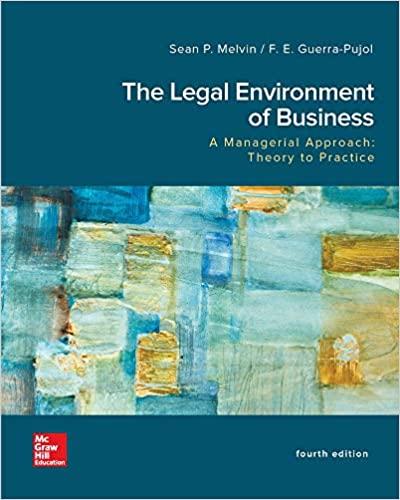Question
Respond to the following post below. Expand on their ideas, discuss the differences between your thoughts and theirs. Explain why you agree or disagree. The
Respond to the following post below. Expand on their ideas, discuss the differences between your thoughts and theirs. Explain why you agree or disagree.
The Equal Employment Opportunity Act of 1972 aimed to strengthen the federal government's commitment to promoting equal employment opportunities and preventing discrimination in the workplace (Dempsey & Forst, 2011). Griggs v. Duke Power Company (1971), decided by the U.S. Supreme Court,dealt with racial discrimination in employment practices (Smith, 2022). The Court ruled that Duke Power Company's requirement of a high school diploma and certain intelligence tests disproportionately affected African American employees and was not a valid measure of job performance (Smith, 2022). While Griggs v. Duke Power Company directly relates to employment practices, its principles of combating disparate impact and promoting equal opportunities have influenced broader discussions about fairness, equity, and anti-discrimination in various fields, including law enforcement. The article I found discusses a legal case involving Dale Kleber, who applied for a senior staff attorney position with CareFusion Corporation (Bailey, 2019). Despite having over 25 years of legal experience, he was not invited for an interview, and the position ultimately went to a 29-year-old attorney with only a few years of experience (Bailey, 2019). Dale Kleber filed a lawsuit under the Age Discrimination in Employment Act, arguing that the seven-year experience cap for the position discriminated against older workers (Bailey, 2019). Judge Hamilton argues that the majority's approach is inconsistent with Griggs, which recognized that anti-discrimination laws extend to job applicants (Bailey, 2019).
Case Brief : In the case of Dale Kleber v. CareFusion Corporation, Dale Kleber, a 58-year-old attorney, applied for a senior staff attorney position, meeting the specified three to seven years of experience. Despite having over 25 years of legal expertise, he was not interviewed, and the position was filled by a 29-year-old with less experience. Kleber filed an Age Discrimination in Employment Act (ADEA) lawsuit, contending the seven-year cap discriminated against older workers. A federal judge dismissed the case, asserting the ADEA only protects current employees. The Seventh Circuit, en banc, affirmed the dismissal, with the majority holding that ADEA protections exclude external job applicants. The dissent argued for a broader interpretation aligned with Griggs v. Duke Power Co (Bailey, 2019).
Step by Step Solution
There are 3 Steps involved in it
Step: 1

Get Instant Access to Expert-Tailored Solutions
See step-by-step solutions with expert insights and AI powered tools for academic success
Step: 2

Step: 3

Ace Your Homework with AI
Get the answers you need in no time with our AI-driven, step-by-step assistance
Get Started


